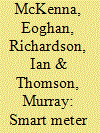|
|
|
Sort Order |
|
|
|
Items / Page
|
|
|
|
|
|
|
| Srl | Item |
| 1 |
ID:
111386


|
|
|
|
|
| Publication |
2012.
|
| Summary/Abstract |
Smart meters are being rolled out in large numbers throughout the world, with proponents claiming they are a critical step in the transition to a low-carbon economy. Yet there are significant unresolved negative reactions to smart meters, principally based on the concern that smart meters might be used to infer the private activities that occur within a dwelling. Though smart meter data is classified as personal data, and as such protected under existing data protection frameworks in the EU, there are relevant exceptions, notably where the data is required for legitimate applications associated with the performance of 'regulated duties'. This paper contributes to this debate by examining the data requirements for some of the proposed applications of smart meter data within the electricity supply industry, and investigates whether the use of personal data can be minimized or even avoided. The discussion includes system balancing, demand reduction, demand response and distribution network operation and planning, and indicates that, for most of these applications, the requirements for personal data can indeed be minimized. 'Privacy friendly' alternatives are discussed.
|
|
|
|
|
|
|
|
|
|
|
|
|
|
|
|
| 2 |
ID:
115703


|
|
|
|
|
| Publication |
2012.
|
| Summary/Abstract |
Residential electrical demand response (DR) offers the prospect of reducing the environmental impact of electricity use, and also the supply costs. However, the relatively small loads and numerous actors imply a large effort: response ratio. Residential DR may be an essential part of future smart grids, but how viable is it in the short to medium term? This paper reviews some DR concepts, then evaluates the propositions that households in cool temperate climates will be in a position to contribute to grid flexibility within the next decade, and that that they will allow some automated load control. Examples of demand response from around the world are discussed in order to assess the main considerations for cool climates. Different tariff types and forms of control are assessed in terms of what is being asked of electricity users, with a focus on real-time pricing and direct load control in energy systems with increasingly distributed resources. The literature points to the significance of thermal loads, supply mix, demand-side infrastructure, market regulation, and the framing of risks and opportunities associated with DR. In concentrating on social aspects of residential demand response, the paper complements the body of work on technical and economic potential.
|
|
|
|
|
|
|
|
|
|
|
|
|
|
|
|
|
|
|
|
|